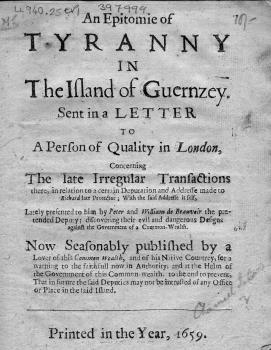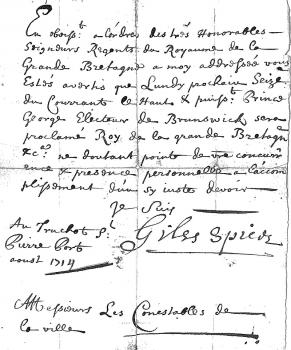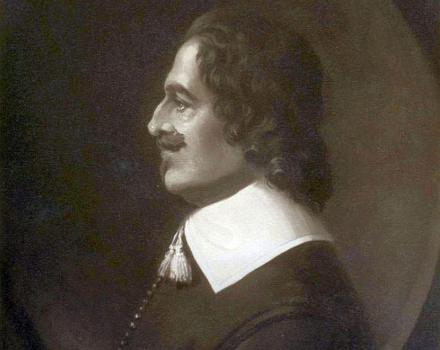The National anthem, translated from the English by John R. Tardif, Esq., and sung at the St Martin's School Jubilee Treat, 28 June 1897, for which it was specially written. From Roswell's Diamond Jubilee Record of the Parish of St Martin's, 1897.
Captain Thomas Saumarez, RN, uncle of Admiral James Saumarez, had a surprisingly easy time when taking possession of the French ship Belliqueux. As a reward he was made commander of the ship and took her on a campaign to the West Indies, but was forced to retire through ill-health. From Sir John Ross' Memoirs and correspondence of Admiral Lord de Saumarez, 1838.
From The Gentlemen's Magazine , XV, p. 694. The Elizabeth , MacKenzie, from Virginia, taken the 15th inst. off Falmouth, by the Lys privateer of St Maloes, and the same night lost on the rocks off Guernsey, but two English and eleven Frenchmen saved.
From Edith Carey's Channel Islands, 1904. Her book may be dated but it remains a great read, full of information, and with lovely watercolour illustrations.

Oliver Cromwell died on September 3, 1658. The States sought to send an address of condolence and loyalty to his son, 'his highness' Richard Cromwell, but were prevented from doing so by the Lieutenant-Governor, Captain Charles Waterhouse, who found their petition 'too submissive.' The leader of the republican party, Pierre De Beauvoir des Granges (1599-1678) and William De Beauvoir du Hoummet, potentially a less committed republican, wrote a defiant letter to Waterhouse, pointing out the Guernsey public's many grievances against him, and proceeded to sneak out of Guernsey and present their petition to Cromwell anyway, taking the opportunity to plead for the unpopular Des Granges to remain as Bailiff. Their actions prompted the publication of a pamphlet, An epitomie of tyranny in the island of Guernsey, which can be found in the Library. It was published anonymously at the beginning of 1659, and accuses the De Beauvoirs of all kinds of misdemeanors.
John Kemp, John Kemp, so bad they hanged him twice! The strange case of John Kemp, and the mystery as to why the rock was named after him is solved.
From the Recueil d'Ordonnances de la Cour Royale, Vol. I, 1852, ed. R. MacCulloch. This seemingly repressive edict in fact represents the desperation felt by the authorities, who were unable to control the excesses of Guernsey youth, no matter how hard they tried.
A translation of part of Laurent Carey's manuscript On the Customary Law of Guernsey, from the Guernsey and Jersey Magazine, Vol. V, 1838, edited by F. B. Tupper. Carey's Essai, written around the 1750s, formed the day-to-day reference for the proceedings of the Royal Court, under whose auspices it was eventually published in 1889. Here he was illustrating the fact that the inhabitants of Guernsey can choose to accept the proposed sovereign or not, who, once accepted, becomes 'un prince de leur propre choix'—and display absolute loyalty when they do so. The photograph below shows the proclamation of George V in Guernsey in 1910. The letter above is an invitation from the Governor to the constables to attend the proclamation of 1714. Library collection.
A report from The Guernsey and Jersey Magazine of 1837. Historical Notices of the Channel Islands, 8, taken from Pierre Carey's private papers. This Pierre [Peter] Carey is the Parliamentary Commissioner who later made a daring escape from imprisonment in Castle Cornet. A transcription of his letter book is in the Library.
From the Guernsey Magazine of February 1885, p. 552.



